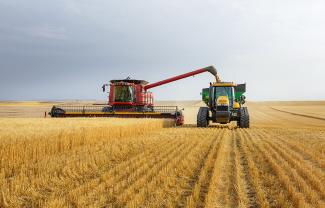
Harvesting Your Financial Future: A Farmer's Guide to Wealth Building
Just as the changing colors of fall signal the time for farmers to bring in the year's harvest, the end of the year presents a critical period for all of us to assess our financial lives and prepare for the future. The diligent work of a farmer—from sowing seeds to tending the fields—is a powerful metaphor for the a year-round process of financial planning, culminating in the "harvest" of a strong financial position.
By understanding the cyclical nature of a farm's seasons, we can gain valuable insight into how to cultivate and grow our own financial security.
Spring: The Season of Sowing and Setting Goals
A farmer's year begins with a clear plan. They decide what crops to plant, where to plant them, and how much to invest in seeds and supplies. This is the financial equivalent of setting clear, specific goals. What are you planting for your future?
- Sow Clear Goals: Are you saving for a down payment on a house, a child's education, or a comfortable retirement? Just as a farmer knows what crop they're planting, you must define your financial aspirations.
- Prepare the Soil (Create a Budget): A healthy financial life begins with a well-prepared budget. A farmer prepares the soil by tilling, fertilizing, and clearing weeds. Your budget is the "soil" that nourishes your financial aspirations. It helps you track income and expenses, identify areas to cut back, and allocate resources effectively.
Summer: The Season of Nurturing and Growth
Once the seeds are planted, the hard work of nurturing begins. Farmers must protect their crops from pests, provide water and nutrients, and monitor their growth. This is the period of consistent effort in financial planning.
- Weed Out Debt: High-interest debt is like an invasive weed. It chokes the growth of your savings and investments. Focus on a debt reduction strategy, like the "debt snowball" or "debt avalanche" methods, to free up resources that can be redirected toward your financial goals.
- Cultivate Your Emergency Fund: Unexpected events, like a sudden equipment breakdown or a dry spell, can devastate a farm.
A financial emergency fund is your safety net for life's unexpected twists and turns. Aim for three to six months of living expenses to preserve your long-term investments from being sold in a crisis. - Water Your Investments: Consistent, regular contributions to your savings and investment accounts are like watering the fields. This practice, known as dollar-cost averaging, can mitigate the impact of market volatility and help your wealth grow steadily over time.
Fall: The Season of Harvesting and Assessment
As the leaves turn and the air cools, the farmer's hard work pays off. It's time to harvest the crop, measure the yield, and plan for the coming winter. In financial planning, fall is the ideal time for an annual review and "harvesting" your gains.
- Take Stock of Your Harvest: Review your investment portfolio to see how it has performed. Has it grown as expected? Has it strayed from your intended allocation? This is a great time to rebalance your portfolio, ensuring it still aligns with your goals and risk tolerance.
- Tax-Loss Harvesting: Farmers harvest their crops, and investors can practice "tax-loss harvesting."
This strategy involves selling investments at a loss to offset capital gains and reduce your overall tax liability. It's a key tactic for a strong financial harvest. - Plan for the Next Cycle: Just as a farmer plans for the coming year's planting, you should use this time to assess your financial plan. Review your retirement contributions, charitable giving strategies, and estate plan. Make sure everything is optimized for the year ahead.
Winter: The Season of Rest and Preparation
After the harvest, a farmer's work is not over. They use the winter to repair equipment, plan for the next season, and prepare for the next cycle of growth.
- Review Your Budget and Goals: Did you meet your financial goals for the year? What did you learn? Use this reflection to make adjustments to your budget and set new, more ambitious goals for the coming year.
- Secure Your Legacy: A farmer ensures their land and family are cared for. Use the quieter winter months to review or create a will, update beneficiaries on your accounts, and consider any necessary estate planning to secure your legacy.
In a world of constant change, the timeless lessons of the farm remain constant. A successful financial life is not a one-time event but a continuous process of planning, nurturing, and assessing. By embracing the disciplined, seasonal approach of a farmer, you can cultivate a financial future that aims to yield a bountiful harvest for years to come.
The opinions voiced in this material are for general information only and are not intended to provide specific advice or recommendations for any individual.
This information is not intended to be a substitute for individualized tax advice. We suggest that you discuss your specific tax situation with a qualified tax advisor.
Rebalancing a portfolio may cause investors to incur tax liabilities and/or transaction costs and does not assure a profit or protect against a loss.

